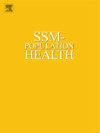Salutogenesis for thriving nations: Sense of coherence and longevity across income strata
IF 3.1
2区 医学
Q1 PUBLIC, ENVIRONMENTAL & OCCUPATIONAL HEALTH
引用次数: 0
Abstract
Traditional salutogenesis literature and theories in health and development have emphasized the role of sense of coherence dimensions—comprehensibility, manageability, and meaningfulness—in shaping population health. However, their relevance at a macro scale, across varying contexts, has been overlooked. What is the relationship between these dimensions and population health at the national level? Do they exert a uniform effect across countries with varying income levels? Using the sense of coherence framework dimensions at the macro-level, we argue that comprehensibility, manageability, and meaningfulness are related to national life-expectancy. We examine their relationship across various economic contexts to refine the boundaries of their links with population health and provide a nuanced understanding of their interplay. Drawing on a panel dataset of 135 countries from 2017 to 2020 from the Quality of Government institute, International Telecommunications Union, and World Bank, we test our hypotheses using a high-dimensional fixed effects model. We find support for two dimensions, manageability, and meaningfulness, in improving life expectancy. We unpack these findings to understand whether they exert a uniform effect or vary across different levels of income. Our findings show that the effectiveness of each dimension on longevity varies by income level, suggesting their relevance is context specific. Through an ecological approach, this study extends Antonovsky's theory of salutogenesis to demonstrate how structural factors at the population level contribute to maintaining health.
繁荣国家的健康成因:跨收入阶层的一致性和长寿感
健康与发展方面的传统健康发生学文献和理论强调了一致性维度感——可理解性、可管理性和意义性——在塑造人口健康方面的作用。然而,它们在宏观尺度上、在不同背景下的相关性却被忽视了。这些方面与国家一级的人口健康之间的关系是什么?它们是否在不同收入水平的国家中产生统一的影响?利用宏观层面的连贯性框架维度,我们认为可理解性、可管理性和意义性与国家预期寿命有关。我们研究了它们在各种经济背景下的关系,以细化它们与人口健康联系的界限,并对它们的相互作用提供细致入微的理解。利用来自政府质量研究所、国际电信联盟和世界银行的135个国家2017年至2020年的面板数据集,我们使用高维固定效应模型检验了我们的假设。我们发现在提高预期寿命方面支持两个维度,可管理性和有意义性。我们对这些发现进行了分析,以了解它们是产生统一的影响,还是在不同的收入水平上有所不同。我们的研究结果表明,每个维度对寿命的有效性因收入水平而异,这表明它们的相关性是特定于环境的。通过生态学方法,本研究扩展了Antonovsky的健康发生理论,以证明人口水平的结构因素如何有助于保持健康。
本文章由计算机程序翻译,如有差异,请以英文原文为准。
求助全文
约1分钟内获得全文
求助全文
来源期刊

Ssm-Population Health
PUBLIC, ENVIRONMENTAL & OCCUPATIONAL HEALTH-
CiteScore
6.50
自引率
2.10%
发文量
298
审稿时长
101 days
期刊介绍:
SSM - Population Health. The new online only, open access, peer reviewed journal in all areas relating Social Science research to population health. SSM - Population Health shares the same Editors-in Chief and general approach to manuscripts as its sister journal, Social Science & Medicine. The journal takes a broad approach to the field especially welcoming interdisciplinary papers from across the Social Sciences and allied areas. SSM - Population Health offers an alternative outlet for work which might not be considered, or is classed as ''out of scope'' elsewhere, and prioritizes fast peer review and publication to the benefit of authors and readers. The journal welcomes all types of paper from traditional primary research articles, replication studies, short communications, methodological studies, instrument validation, opinion pieces, literature reviews, etc. SSM - Population Health also offers the opportunity to publish special issues or sections to reflect current interest and research in topical or developing areas. The journal fully supports authors wanting to present their research in an innovative fashion though the use of multimedia formats.
 求助内容:
求助内容: 应助结果提醒方式:
应助结果提醒方式:


